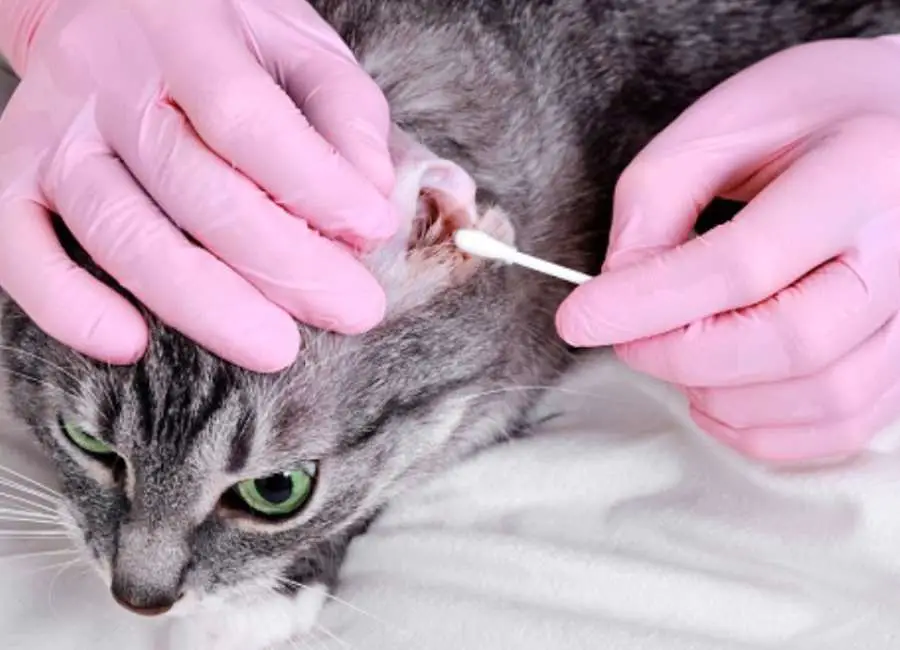8 Common Ways Cats Get Ear Mites & Tips

There are a lot of ways cats get ear mites which we will be explaining in this post, so keep reading…
Ear mites are tiny parasitic creatures that can cause a lot of discomfort and even health problems in cats.
They are easily spread through the air and can cause intense itching in the ears.
The most common way cats get ear mites is when they share their bed with another cat, which allows the mites to easily transfer from one cat to the other.
Other ways cats can get ear mites include exposure to infected environments, being groomed too vigorously, or being handled roughly.
If you think your cat may have ear mites, the first step is to take them to the veterinarian for a check-up.
Common Ways Cats Get Ear Mites
There are a variety of ways that cats can get ear mites. Some of the most common ways are listed below.
Direct contact with an infected animal
This is the most common way that cats get ear mites.
If your cat comes into contact with another animal that has ear mites, there is a good chance that your cat will contract them as well.
If your cat spends time around other animals, it can easily pick up ear mites.
These mites are contagious, so if your cat has them, it’s likely that other animals in your household do too.
Indirect contact with an infected animal
If you have an infected animal, your cat may get ear mites from indirect contact via going to areas the infected animal was.
This can happen if your cat sleeps in the same bed as the infected animal or if the infected animal brushes up against your cat.
Contact with an infected environment
If you have an infected animal in your home, your cat may get ear mites from contact with the environment.
This can happen if your cat rubs against something that the infected animal has been in contact with.
Contact with an infected person
If you have an infected animal in your home, your cat may get ear mites from contact with an infected person.
This can happen if the infected person brushes up against your cat or if your cat comes into contact with the infected person’s clothing.
Believe it or not, humans can be a source of ear mites for cats. If you have ear mites, there’s a chance your cat can pick them up from you.
Contact with an infected animal’s feces
If you have an infected animal in your home, your cat may get ear mites from contact with the animal’s feces.
This can happen if your cat comes into contact with the animal’s litter box or if the animal defecates in your home.
If you have an infected animal in your home, your cat may get ear mites from ingestion of the animal’s feces.
This can happen if your cat ingests the animal’s feces directly or if your cat eats food that has been contaminated with the animal’s feces
Contact with an infected animal’s skin
If you have an infected animal in your home, your cat may get ear mites from contact with the animal’s skin.
This can happen if the infected animal brushes up against your cat or if your cat comes into contact with the infected animal’s skin.
If you have an infected animal in your home, your cat may get ear mites from ingestion of the animal’s skin.
This can happen if your cat ingests the animal’s skin directly or if your cat eats food that has been contaminated with the animal’s skin.
If you think that your cat has ear mites, it is important to take them to the vet as soon as possible.
The vet can prescribe a course of treatment that will kill the ear mites and help to prevent your cat from getting them again.
From dirt and debris
If your cat spends time outdoors, it can pick up ear mites from dirt and debris.
These mites thrive in dirty environments, so it’s important to keep your cat’s ears clean if they spend time outside.
From contaminated bedding
If your cat sleeps on contaminated bedding, it can pick up ear mites.
These mites can survive in bedding for a long time, so it’s essential to wash their bedding often.
If you think your cat has ear mites, it’s important to take them to the vet right away.
Keep in mind that ear mites might cause depression in cats.
How ear mites work in cats
Ear mites can cause a lot of irritation and discomfort to cats, so it’s important to get them treated as soon as possible.
Ear mites are a common problem for cats and can be extremely uncomfortable.
They are tiny parasites that live in the ear canal and feed on the wax and oil that keep the ear healthy.
If your cat has ear mites, you will notice them shaking their head and scratching their ears frequently.
They may also have black or brown discharge in their ears.
Ear mites are most commonly transmitted from other animals, but they can also be transmitted from contact with contaminated surfaces.
If you think your cat has ear mites, it is important to take them to the vet, so they can be properly treated.
Signs your cat has ear mites
Here are some common signs your cat might have ear mites:
- If the cat has excessive scratching or rubbing of its ears.
- The cat has a red or inflamed ear.
- The cat may have difficulty sleeping.
- If the cat has a discharge from its ear.
- Your cat has trouble hearing.
- The cat has difficulty moving its ear.
- The cat may have difficulty maintaining balance.
- Your cat constantly shakes its head.
- The cat has decreased appetite.
- The cat has difficulty breathing.
Common ways to prevent ear mites in cats
Here are some common ways to prevent ear mites in cats:
- Keep your cat clean and dry.
- Use a flea and tick product on your cat.
- Use a humidifier in your home.
- Give your cat a monthly supplement of omega-3 fatty acids.
- Use a barrier cream on your cat’s skin.
- Use a topical ear mite treatment on your cat.
- Always check and clean your cat ears.
- Get your cat vaccinated against ear mites.
- Keep your cat’s environment clean and free of mites.
Treatment of ear mites

If you think your pet has ear mites, take them to the vet for a professional diagnosis.
If ear mites are found, your vet will likely prescribe an ear drops medication that will kill the mites.
You will need to apply the ear drops to your pet’s ear(s) according to your vet’s instructions.
Be sure to follow the instructions carefully, as ear drops can be irritating to the skin.
In some cases, your vet may also recommend that you clean your pet’s ear(s) with a special solution before applying the ear drops.
After treatment, the ear mites should die off within a few days.
However, it is important to continue treatment for at least two weeks to make sure all the mites are gone. If you stop treatment too soon, the mites may come back.
There are several ways you can treat ear mites at home, but it is always best to consult with your veterinarian first.
They can prescribe the best course of treatment for your cat.
- Clean your cat’s ears with a vet-approved cleaner.
- Apply a vet-prescribed medication to your cat’s ears.
- Use a home remedy such as mineral oil, garlic, or tea tree oil.
- Try over-the-counter ear mite treatments.
- Keep your cat’s ears clean and dry.
- Avoid using cotton swabs or other objects in your cat’s ears.
- Give your cat regular baths.
- Keep your cat away from other animals that may have ear mites.
- Talk to your vet about preventative measures you can take to keep your cat from getting ear mites again.
Ear mites are a nuisance, but with proper treatment, your cat will be back to normal in no time.
If you have any concerns, or if your cat’s condition does not improve, be sure to talk to your veterinarian.
More: 9 Common Reasons Why Cats Meow.
Ways ear mites affect cats
Here are some common ways ear mites affect cats:
- Ear mites can cause restlessness in cats.
- Ear mites can cause inflammation of the ear canal and other parts of the ear.
- Ear mites can cause a loss of hearing in cats.
- Ear mites can cause ear wax build-up.
- Ear mites can cause a host of other health problems in cats.
- Ear mites can cause the cat to lose its balance.
- Ear mites can cause the cat to have an allergic reaction.
- Ear mites can cause an infection in the ear.
- Ear mites might cause bad odor.
